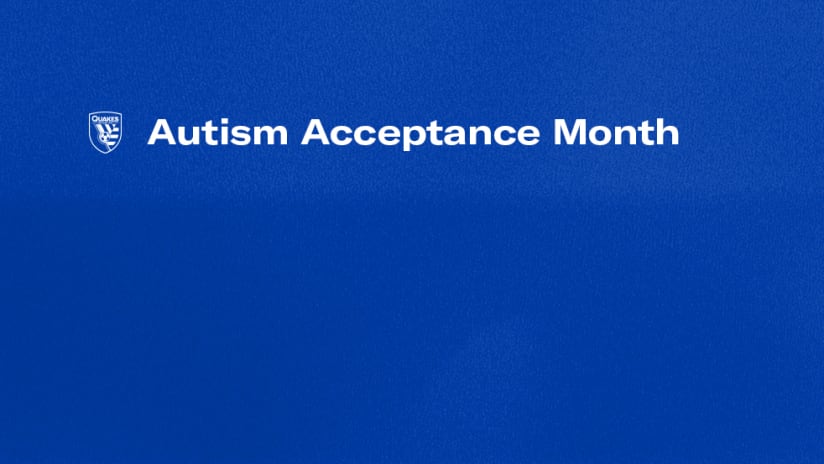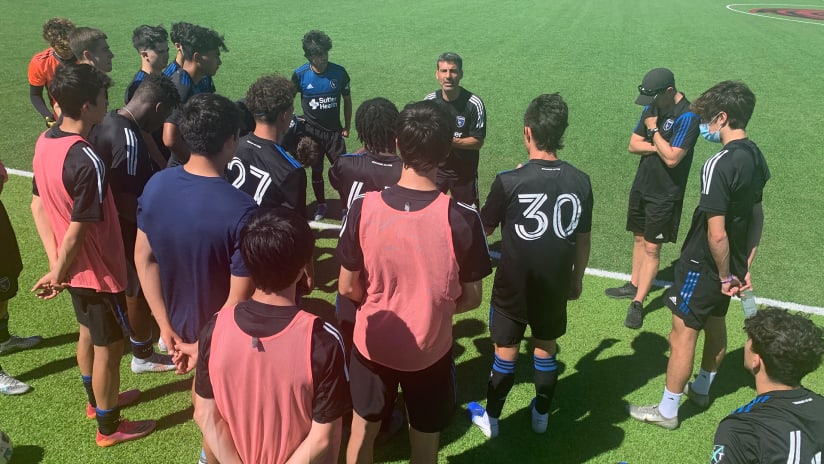Quakes: On behalf of Team Forward Together, welcome to our first discussion, we're joined today by Quakes Season Ticket Holder Martin Slyngstad. Martin, welcome and thanks for taking some time to talk to us today.
Martin: Thank you for having me. I really appreciate it.
Q: Martin, we're here. It's it's autism acceptance day, and basically, we want to inform the Quakes staff and anyone who might be watching or listening to the challenges that that you face on a daily basis and and the things and ways that Quakes employees or just regular people can can help make your experience at our stadium better…on this planet better, you know, whatever it is. So first and foremost, I wanted to start off and ask about the language around Autism, are there terms or words that are preferred?
M: From other people that I hang out with in my community, they would prefer what's the name of it like on the spectrum? You know, some spectrum is very broad. It's been a while since I've actually explained something like this, but. We would definitely prefer “someone on the spectrum” vs “someone that's autistic”
Q: That's that's good to know and we'll keep that in mind as our conversation continues. Next question, why are you passionate about this? Why did you accept this invitation to come here and talk to me today?
M: Well, first off, I was diagnosed at age five and growing up going through the school systems and everything, It was definitely difficult. And the reason why I'm here to share my story is because a lot of people don't know what we go through. And I'm wanting to step out of my comfort zone and bring light to not only the stuff that we deal with, but also promote stuff to help us be more accepted because the whole world awareness is pretty overused at this point.
And I've had people tell me, “oh, yeah, we'll definitely support you”, and then when the time comes, they don't. So I'm definitely I I wanted to take it on this year, because I know it hasn't been easy and with all the news reports and all the stuff that I see, it's I just really want to step up and really help bring acceptance.
Q: Awesome. We really appreciate that. And you kind of mentioned this a little bit, but you are the one that pushed us to use the term “Autism Awareness Day” but rather to to change that to “Autism Acceptance Day”. You want to talk about that a little bit, why you thought that was important?
M: Acceptance should be the term used because with all the awareness that is being done. Just even talking about it is a little difficult because I've been doing so much for this year in hopes to bring to bring acceptance, and I've actually started working on multiple videos. I've got a book written out and I've been on the news a couple times just to really help to help us be more accepted in society because it has not been easy.
Q: Speaking of your videos, they are a great resource, I was able to check them out. If you are interested in this conversation, want to know more? I'd recommend checking out Martin's videos…But one of your videos is actually my next question. You kind of tackle the common misconceptions about autism. I want to know what can we do to combat these?
M: I think one way that would make it more helpful is by reaching out to us to learn like what we go through and to hear our stories, because that can be one step towards being accepted and finally scratching out all those misconceptions that you that everybody hears. The reason why we don't really speak about our story is because people have laughed at us or something like that, and it's I just think people need to reach out and hear our story.
One of the biggest misconceptions that we deal with is that autism is curable, it is not. The whole one size fits all diagnosis that's all wrong, no two people with autism are the same. So as you're talking with me, I'm one person with autism. If you meet somebody else that's on the spectrum, they are totally different. And it all ranges from somebody not able to speak that well and then the more milder side which people are able to do things daily, and I think that's one of the biggest ones. And the last one, this one's been hard on me a little bit, Because I've had people get upset at me because I don't really show emotion or sympathy, but what they don't realize is I'm not able to express that and I have this thing called nonverbal learning disorder. So one of the things about it is I'm not able to read people's emotions. Like if they're upset, it's hard for me to tell and I can't tell through their body movement, like if they're tense or whatever.
Q: What is something somebody like me might not think about that people on the spectrum have to deal with on a regular basis?
M: One of the biggest things that I've dealt with is I would walk by some people and it still happens to this day, I walk by some people, you know, and say like, “hey, how's it going?” and then they would say hi back and when I start walking away they would start saying stuff like whisper stuff and laugh, and that's definitely something I wish we didn't have to go through on a daily basis. Rumors have been started, which is definitely very damaging to us. Along with just everyday people tearing us down because they think that we're not worth it. And trying to make friends has not been easy. So one thing that I do, of course, is go to Quakes games because it not only keeps my mind distracted, it helps me recharge and be ready for whatever the next week, whatever I face next week.
Q: Well, it's nice to hear that that they found a little oasis here at Earthquake Stadium. Talking about Quakes games, when you come to a quick game, you know, what's that experience been like for you, and what could we do help people who are on the spectrum have a better experience?
M: The experience has been great and everybody is very welcoming and every time I would show up to a game, you know, I go over to the little booth with the with the Reps and everybody is like “hey, how's it going, Martin?” It's great to see and really welcoming to know. And for those who do come to a Quakes Game and end up being overwhelmed what would be cool is having, like little sensory areas. Some kids on the spectrum they have like sensory needs, so maybe theres a little station that has play dough and stuff like that to help. Some of us are really noise sensitive so I think if ear plugs or little disposable headphones would be available, that would definitely help too.
I think one of the first steps would be just to really get to know other people on the spectrum and just hear their stories, because really we have a tough time talking about it because we feel like nobody would care. I think that is one definite big first step into helping us because when you start learning about what you can do to help, then that's going to allow us to feel more accepted and be more open towards people.
Q: Tell us about the book that you wrote!
M: I decided to write this book probably seven years ago, because. Back around that time, really nothing was even being brought up and really nobody whose story was able to be heard and. I stepped out of my comfort zone to discuss about what it was like growing up from the hardships that I went through to. What it's been like working in the field. Of of autism and even. Just bringing up. What I hope would be accomplished in the future and the reason why it took me so long to write is because near the end, as I finished writing it, I just got that, you know, those negative thoughts in my mind, like, oh, nobody's going to really care about the book, you know? And it's definitely been something it was definitely something that I fought with. And last year, you know, nothing was open. So I just decided. To finish it, and on April 24th, it'll be one year since it's been released.
Q: What do you do for work?
M: I am a behavior specialist. This is my second year. And what I usually do is go to clients houses and provide. Behavior therapy. So let's just say, for example, I have one kid who has a tough time combining sentences, the most of the time I would be focused on that, like helping them combine words and the way I'd run it as it makes more activity based and make it more fun for them. And I'm also. An executive coordinator for the company, so I Talk to different sports teams to help try to get an inclusion day set up. You know, everybody's invited, everybody is included because. I want those like me to know that you are included. I really want to help push that and. I'm actually. Close to a couple sports teams. We're close to finalizing some events, and it would be cool to get something done with you guys because being a season ticket holder and hopefully doing something like this would be just incredible.
Q: Yeah, absolutely, It’s on our radar for sure and we definitely want to see it happen. Thanks for all your work. It sounds like your perspective must be invaluable for helping those kids along.
M: Yeah, it's definitely this month is definitely April is going to be a grind. And I know after this third video that I'm going to be doing, which is. Going to be a little hard to do, but I feel once when I finalize that. It'll be a little easier. I mean, of course, it's not really easy, but I feel once when I finish this one, there's going to be. Change happening slowly but surely. Excellent.
Q: Well, whatever we can do to help out, let us know, Martin, we really appreciate your time today and yeah, look forward to seeing you out of the stadium once once we kick off not too long from now…And if you are interested in sharing your story like Martin, please let us know. Team Forward Together is always looking for more people, diverse stories, backgrounds to share. So yeah, definitely get at us!
Martin, I'll see you at he home opener, April 24th, against FC Dallas!




